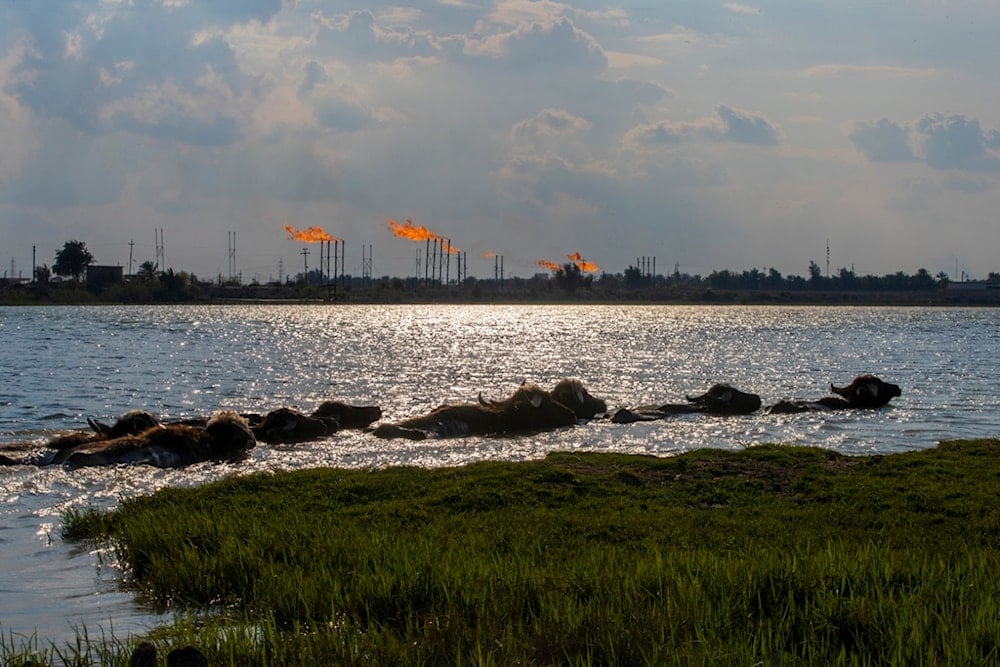Iraqi Kurdistan oil output drops by 150,000 bpd after drone strikes
The attacks have targeted US-linked infrastructure in what observers view as a strategic blow against foreign control over Iraq’s energy resources.
-

Water buffaloes swim near the Nihran Bin Omar oil field north of Basra, Iraq, Wednesday, March 22, 2023. (AP)
A coordinated wave of drone strikes has severely disrupted oil production in the Kurdistan region of northern Iraq, slashing output by up to 150,000 barrels per day and shutting down key infrastructure tied to US and Western oil firms. The attacks mark a major escalation in what many observers now call a strategic campaign to dismantle foreign economic control over Iraq's resources.
According to Reuters and regional sources, the strikes, now in their third consecutive day, have forced the closure of multiple oilfields in Dohuk and Erbil governorates, nearly halving the region's previous production of 285,000 bpd. No group has claimed responsibility, but early investigations by Kurdish officials suggest the drones originated from areas controlled by Resistance factions, signaling a possible retaliatory move against US interests in the region.
Targeted facilities: Western oil firms under fire
The shutdown has affected oilfields operated by major Western companies entrenched in the KRG's energy apparatus. Gulf Keystone Petroleum, the British firm managing the Shaikan field northwest of Erbil, announced a temporary production halt as a "precaution". Norwegian operator DNO ceased operations at Tawke and Peshkabour, key fields near the Turkish border, after explosions damaged infrastructure, with its stock price suffering a steep drop.
Meanwhile, the Sarsang field, run by US-based HKN Energy, and the Ain Sifni site operated by Hunt Oil, were also struck. The latter was reportedly targeted just hours before a scheduled development deal in another part of Iraq. Earlier this week, a drone attack on the Khurmala field disrupted vital water pipelines.
The KRG's Ministry of Natural Resources described the drone raids as "terrorist attacks", yet failed to explain how such coordinated operations managed to bypass security forces and target US-aligned facilities with precision. The Association of the Petroleum Industry of Kurdistan (APIKUR) confirmed that nearly all of its member companies, regardless of direct hits, have suspended operations.
Decades of illegitimate exploitation
Since 2007, the Kurdistan Regional Government has bypassed Iraq's central authorities, signing dozens of contracts with Western firms to export oil through Turkey without federal oversight. This parallel economy, propped up by the United States, has effectively turned northern Iraq into an enclave for Western exploitation, stripping Baghdad of sovereign control over its own resources while funneling profits into foreign hands.
The resumption of exports in early 2025, following a two-year halt and a $1.5 billion ruling against Turkey for enabling illegal Kurdish oil sales, was widely seen as part of a broader US strategy to stabilize global oil markets while escalating its "maximum pressure" campaign on Iran. Washington has reportedly pressured Iraq to reroute Kurdish crude through Turkey in order to limit Iranian oil revenues and disrupt what it described as "smuggling" across the Iran-Iraq border.
Neither Washington nor Erbil has issued a direct response, underscoring the vulnerability of US-backed assets in an increasingly unstable regional landscape.
Read more: US bases across region are point of vulnerability, not strength: IRGC

 3 Min Read
3 Min Read








